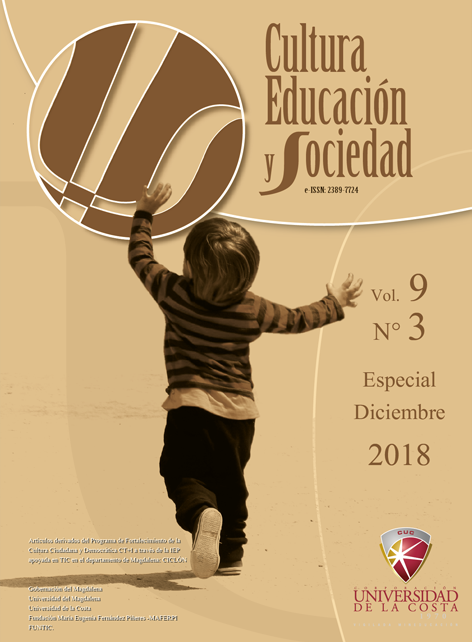Strengthening reading competence supported by the use of Information and Communication Technologies
DOI:
https://doi.org/10.17981/cultedusoc.9.3.2018.42Keywords:
Reading, playfulcompetence, information and communication technologies, technological tools.Abstract
The present investigation arises from the problematic that is evidenced, in terms of the acquisition and development of the reading competences in the students, taking into account the low results obtained in the internal and external tests that are applied to the students of the Institution. The objective of the research corresponds to strengthen the reading comprehension of the students of the Departmental Educational Institution of Guáimaro Magdalena, through the ludic supported on ICT. The research is based on a qualitative methodology, using techniques such as observation, the survey and the diagnostic test. The results show that the articulation of ICT within the educational context is vitally important not only from a didactic perspective but also as a catalyst for pedagogical work. Through the investigative process and responding to the general objective in which it seeks to promote understanding reader through the use of technological tools.
Downloads
References
Amézquita Zárate, P. (2014). Minería y petróleo en Colombia: maldición interna de los recursos. Económicas CUC, 35(1), 45-59.Arias, F. (2012). El proyecto de investigacion: Introducción a la metodología científica (6ª Edición). Caracas, Venezuela:Editorial Episteme.
Cortés-Peña OF, Pinto-Santos AR, Atrio SI. (2015). E-portafolio como herramienta construccionista del aprendizaje activo en tecnología educativa. Revista Lasallista de Investigación,12(2),36-44.
De la Cruz, L. (22 de Mayo de 2017). 50% de estudiantes tienen baja comprensión de lectura. El heraldo. Recuperado de: https://www.elheraldo.co/local/50-de-estudiantes-tienen-baja-comprension-de-lectura-55306
Gallardo, Y., y Moreno, A. (1998). Aprender a investigar. Bogotá, Colombia: ARFO EDITORES LTDA.
Galán, M. (2013). La observación como método de investigación [Mensaje en un blog]. Recuperado de: http://manuelgalan.blogspot.com.co/2013/02/la-observacion-como-metodo-de_21.html
Guiza, M. (2011). Trabajo colaborativo en la web: entorno virtual de autogestión para docentes (Tesis doctoral). Recuperado de: http://www.tdx.cat/bitstream/handle/10803/59037/tmge1de1.pdf
Martín, M., y Vera, J. (2012). Dificultades en el aprendizaje de la lectoescritura en el primer ciclo de educación primaria. Intervención en el aula (Tesis de pregrado). Recuperado de: https://uvadoc.uva.es/bitstream/10324/4828/1/TFG-L377.pdf
Ministerio de educación. (2015). Colombia, la mejor educada en el 2025. Recuperado de: https://www.mineducacion.gov.co/1621/articles-355154_foto_portada.pdf
Montenegro, M., Blanco, P., & Cortés, O. (2013). Papel de las habilidades metalingüísticas en los procesos de lectura y escritura en la educación superior. Escenarios, 11(2), 82-86.
Muntaner, J. (1997). La formación del profesorado y los alumnos con N.E.E. Educació i Cultura, 1, 73-87.
Patiño Builes, A. (2015). Tendencias tecnológicas que influyen en el aumento de la productividad empresarial. INGE CUC, 11(2), 84-96. https://doi.org/10.17981/ingecuc.11.2.2015.09
Rojas, L. (2005). Influencia del entorno familiar (Tesis de posgrado). Recuperado de: http://www.javeriana.edu.co/biblos/tesis/medicina/tesis24.pdf
Sánchez, E. (1993). Los textos expositivos. Estrategias para mejorar su comprensión. Madrid, España: Santillana.
Spina, M., Rohvein, C., Urrutia, S., Roark, G., Paravié, D., & Corres, G. (2016). Aplicación del modelo SCOR en pymes metalmecánicas de Olavarría. INGE CUC, 12(2), 50-57. https://doi.org/10.17981/ingecuc.12.2.2016.05
Savater, F. (2001). El valor de educar. Bogotá, Colombia: Ariel.
Vélaz, C., y Vaillant, D. (2009). Aprendizaje y desarrollo profesional docente. España: Fundación Santillana.
Downloads
Published
How to Cite
Issue
Section
License
Copyright (c) 2018 CULTURA EDUCACIÓN Y SOCIEDAD

This work is licensed under a Creative Commons Attribution-NonCommercial-NoDerivatives 4.0 International License.
![]()
Creative Commons 2020 CULTURA EDUCACIÓN Y SOCIEDAD
This article is under international license Creative Commons Reconocimiento-NoComercial-SinObrasDerivadas 4.0.
The published articles are the sole responsibility of their authors and do not necessarily reflect the opinions of the editorial committee.
CULTURA EDUCACIÓN Y SOCIEDAD respects the moral rights of its authors, who assign to the editorial committee the patrimonial rights of the published material. In turn, the authors inform that this work is unpublished and has not been previously published.
All articles are under a:
Licencia Creative Commons Atribución-NoComercial-SinDerivadas 4.0 Internacional.
![]()


 English
English
 Español (España)
Español (España)




_12.53_.27_p_. m_._3.png)





_12.57_.35_p_. m_._3.png)
_12.50_.37_p_. m_._3.png)



